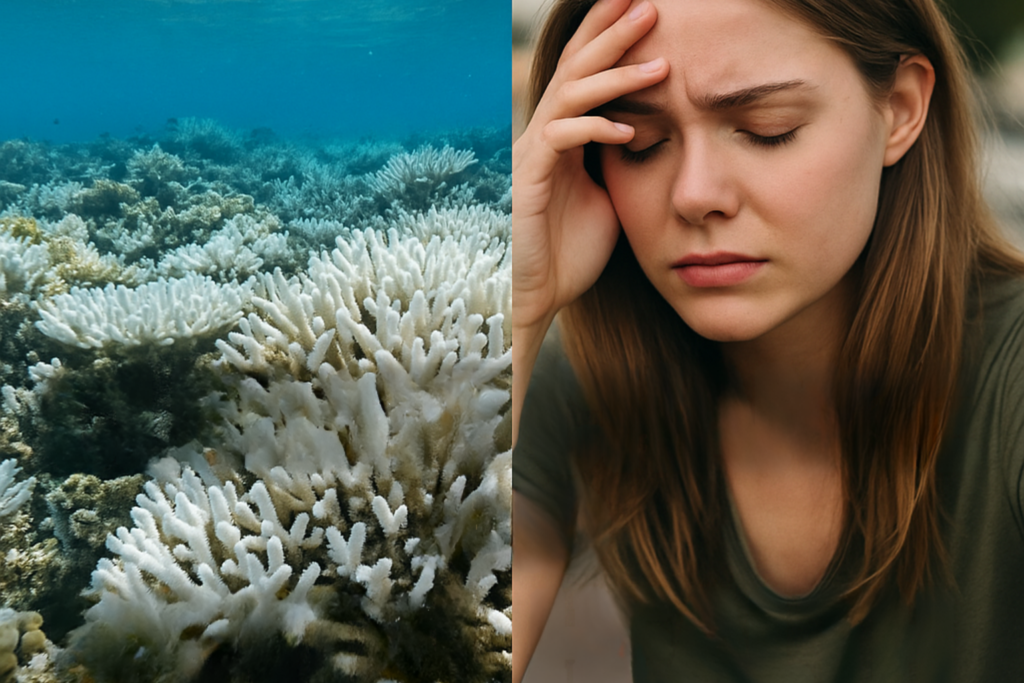I was watching a documentary about the ocean when a scene paralyzed me: vast coral reefs, once vibrant and full of life, now completely white, silent, as if they were dead.
At that moment, I felt a tightness in my chest. Not only because of the environmental tragedy but because of the direct connection to what I teach at InfoProElevate: when the environment suffers, our minds also suffer.
And this is not just an ecological statistic — it’s an extreme climate event with deep consequences for collective mental health, triggering emotions such as anxiety, eco-anxiety, and feelings of loss.
As a psychologist and integrative therapist, creator of the A.V.E.® and R.A.E.® methods, I see how global situations like this affect our emotional system, awakening fears, insecurities, and the urgent need to strengthen our psychological resilience.
What Is Coral Bleaching and Why Does It Psychologically Affect Us?

Bleaching or coral bleaching happens when rising water temperatures, caused by global warming, lead corals to expel the algae living in symbiosis with them, losing color and vitality.
The current event, described by climate change and environmental conservation experts, is the largest in history, affecting regions like the Great Barrier Reef in the Pacific and significant parts of the Atlantic.
But how does this connect to our mental health?
Studies show that constant exposure to environmental disasters is linked to increased cases of:
Chronic anxiety.
Depression.
Post-traumatic stress.
Feelings of helplessness and ecological grief.
Eco-Anxiety: A Phenomenon We Cannot Ignore
Eco-anxiety, one of the most searched terms globally, describes the psychological distress related to awareness of environmental changes.
This phenomenon is increasingly present in therapy sessions, especially among young people who feel a profound concern for the planet’s future.
In recent weeks, searches for terms like climate crisis and mental health support have risen significantly, reflecting this collective anguish.
How to Strengthen Psychological Resilience in the Face of Climate Change
In a scenario where nature shows signs of exhaustion, it is essential to cultivate emotional resilience.
At InfoProElevate, I teach that real change begins within:
With A.V.E.®, we can recalibrate our energy, reducing emotional impacts caused by excessive catastrophic news and images.
With R.A.E.®, we can dissolve limiting beliefs related to helplessness in the face of environmental catastrophes.
Signs You Are Being Psychologically Impacted by Climate Events
Feeling of deep sadness when reading environmental news.
Difficulty sleeping, linked to worries about global warming.
Anxiety spikes when thinking about the future.
Demotivation and a sense of powerlessness in the face of the ecological crisis.
If you identified with these signs, know that it is possible to create an internal space of care and vibrational balance.
5 Therapeutic Practices to Cope with the Psychological Impact of Environmental Disasters
1. Reorganize Your Exposure:
Limit consumption of alarmist content about natural disasters and seek balanced sources.
2. Strengthen Your Energetic Self-Care:
Incorporate meditation, conscious breathing, and connecting with nature — even through indoor plants — into your routine.
3. Engage in Positive Actions:
Participating in sustainability initiatives can reduce feelings of helplessness.
4. Reprogram Your Beliefs:
Use affirmations like: “I am part of the healing, not the problem“.
5. Seek Therapeutic Support:
Techniques such as mental reprogramming and emotional resilience, like A.V.E.® and R.A.E.®, help overcome stress caused by climate catastrophes.
The Deep Connection Between Nature and Our Minds
The silence of the corals is a silent scream that echoes within us. When nature loses its vitality, we feel, even unconsciously, the loss of an ancestral bond.
Therefore, the invitation I make here, at InfoProElevate, is for you to:
Reprogram your mind to become more resilient.
Raise your frequency to connect with healthier vibrational states.
Awaken your consciousness to be an agent of healing, both internal and planetary.
Conclusion: We Are All Part of the Same Ecosystem
Faced with the largest coral bleaching event in history, we must remember: the planet is not separate from us. Its pain is our pain.
But it is also possible to transform this suffering into conscious action and personal expansion.
If you want to learn more about how to strengthen yourself emotionally and vibrationally in the face of climate change, explore the content and courses at InfoProElevate.
Reprogram your mind. Raise your frequency. Awaken your new self.
